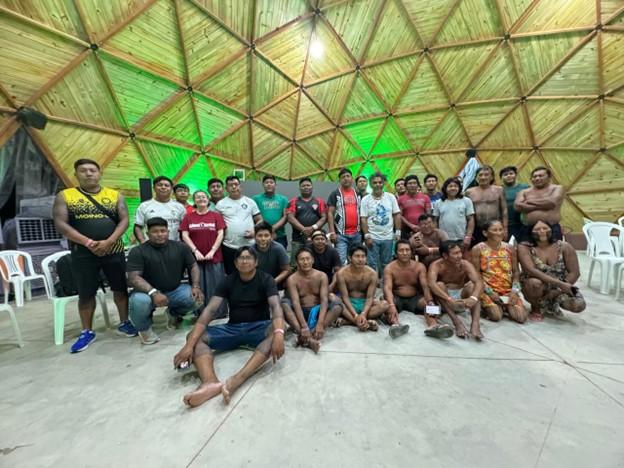
The Xikrin Peoples face severe humanitarian and environmental crises as Vale’s nickel and other metal mining contaminates their rivers, harms their health, and destroys their ancestral territory, endangering their cultural survival and the environmental integrity of the region. The negative impacts on the health of the Xikrin people are so severe that some studies show that 98% of the communities in the Cateté lands are seriously contaminated.
The advocacy note below, which Xikrin Peoples shared with Cultural Survival, provides the context and their primary concerns.
“We can no longer endure mining on our land. Our food and our bodies are contaminated, and the rivers and fish are sick. Large-scale mining and illegal miners must stop. The authorities are doing nothing; we have been facing this since 1980.” Chief Xikrin

Photo from Vale S.A. website https://vale.com/pt/esg/iniciativaspict
Contamination of the Cateté River and the Impacts on the Xikrin do Cateté Indigenous Peoples
The issue of contamination in the Cateté River is one of the most severe ongoing humanitarian, socio-environmental, and ethno-cultural crises in the southeastern region of the State of Pará [State host of the COP 30]. This situation has been extensively documented in academic studies, technical reports, and official analyses, and it has also been the subject of Public Civil Actions filed by the Federal Prosecutor’s Office (MPF) against the mining company Vale S.A., the Federal Government, and the State of Pará due to the harms inflicted on the Xikrin do Cateté Indigenous Peoples.
1. Source of Contamination and Its Link to Mining
The primary source of contamination identified in technical studies and forensic reports is Vale S.A.’s nickel mining operation, particularly the Onça Puma Nickel Mine, located near the Xikrin do Cateté Indigenous Land. Mining activities have been repeatedly associated with the release of tailings and metallic particles into the water bodies that form the Cateté basin, especially the Cateté and Itacaiúnas rivers, which are essential for the physical, cultural, and spiritual sustenance of the Xikrin People.
Laboratory analyses — including studies conducted by the Federal University of Pará (UFPA) — have detected alarming concentrations of heavy metals such as nickel, aluminum, lead, barium, cobalt, and manganese, often exceeding legal limits and public health safety standards. In some reports, experts identified a specific “chemical signature” — metallic traces associated with nickel-mining production — establishing a direct correlation between the contamination and the company’s operations.
2. Impacts on Xikrin Health, Territory, and Community Life
Available studies indicate a dramatic scenario of internal contamination among the Xikrin population. Recent research revealed that 98.5% of the Indigenous individuals tested showed elevated levels of heavy metals, indicating chronic and continuous exposure. The situation is even more serious for children: in certain analyses, 100% of the children evaluated showed the accumulation of one or more metals above acceptable standards, pointing to contamination transmitted during pregnancy, breastfeeding, and through daily consumption of contaminated water and food.
The health risks are extensive: kidney damage, neurological changes, endocrine disorders, possible congenital malformations, dermatitis, persistent diarrhea, vomiting, and other symptoms associated with chronic heavy-metal poisoning. The impact, however, is not merely biological. The degradation of the Cateté River — repeatedly described by the community as a “sick” or “dead” river — undermines traditional practices of fishing, hunting, gathering, ritual bathing, and community life, producing profound effects on the cultural identity, territoriality, cosmology, and well-being of the Xikrin Peoples.
As a result of the contamination, entire villages have become dependent on purchasing mineral water and fish from other regions, a situation that threatens the community’s food autonomy and cultural security, breaking millennia-old practices of relating to the territory.
3. Legal Actions, Accountability, and Required Measures
In response to the severity of the damages, the Federal Prosecutor’s Office filed a Public Civil Action seeking to hold Vale S.A., the Federal Government, and the State of Pará accountable. In this lawsuit, the MPF requests:
- Guaranteed specialized and continuous medical care for contaminated Indigenous individuals, fully funded by the mining company.
- Implementation of a permanent health-monitoring program, including regular examinations and multidisciplinary care.
- Immediate adoption of mitigation and environmental-reparation measures, focusing on the depollution, revitalization, and restoration of the affected watershed.
- Rigorous state monitoring of compliance with environmental licensing conditions imposed on the mining operation, as well as strengthened environmental oversight by the relevant agencies.
- Implementation of socio-economic and food-security measures, given the already irreversible damage to the traditional Xikrin territory.
Despite extensive technical evidence, Vale S.A. has repeatedly denied being the source of the contamination, alleging compliance with environmental conditions and the regularity of its mining operations. However, the company faces multiple unfavorable rulings, sanctions, MPF recommendations, and judicial orders related to the case, demonstrating the complexity and seriousness of the dispute.
4. Structural Conflict and Violation of Fundamental Rights
The Xikrin do Cateté case has become emblematic in illustrating the structural conflicts between large-scale mineral enterprises and the territorial, environmental, cultural, and health rights of Indigenous peoples, as guaranteed by the 1988 Federal Constitution and the International Labour Organization (ILO) Convention 169. The combination of environmental degradation, human contamination, cultural impacts, and community resistance reveals a scenario of extreme vulnerability that demands urgent, structural, and long-term responses.
List of demands
Recipients:
- Federal Public Prosecutor’s Office (MPF)
- National Foundation of Indigenous Peoples (FUNAI)
- Special Secretariat for Indigenous Health (SESAI)
- Brazilian Institute of the Environment (IBAMA)
- Chico Mendes Institute (ICMBio)
- Government of the State of Pará
- City Council and Municipality of Parauapebas
- Other competent authorities
I. Recognition and Accountability
- Formal and public acknowledgment by Vale S.A. of its responsibility for environmental and human contamination.
- Signing of a specific Conduct Adjustment Agreement (TAC) for full reparation and prevention of new harms.
- Complete review of the environmental licenses for the Onça Puma operation, ensuring non-repetition and stricter conditions.
- Monetary compensation and environmental reparations for the Indigenous families affected.
II. Indigenous Health – Immediate and Permanent Measures
- Implementation of the Xikrin Comprehensive Health Plan (PIS-X), permanently funded by Vale, including revision and expansion of the current Global Agreement.
- Continuous medical care delivered by a specialized multidisciplinary team (toxicology, pediatrics, neurology, nephrology, etc.).
- Construction of a specialized hospital unit for heavy metal poisoning in Parauapebas (or an equivalent structure defined by the community).
- Quarterly toxicological exams for the entire Indigenous population.
- Emergency air and ground transportation fully paid for by the company.
- Individual compensation for biological harm, existential harm, and health damage.
- Guarantee of full operation and maintenance of the Xikrin Indigenous Health Support House in Carajás, located in the Municipality of Parauapebas/PA.
III. Water and Food Security
- Lifetime provision of potable water to the villages, including autonomous and community-operated supply systems.
- Permanent guarantee of access to traditional foods (fish, game, and subsistence products).
- Collective compensation for loss of food autonomy and productive territoriality.
- Creation of sustainable fish hatcheries and traditional management programs.
IV. Environmental Recovery and Management
- Preparation and full implementation of the Cateté Basin Recovery Plan (PRBC), using technologies for heavy metal remediation.
- Continuous environmental monitoring by an independent institution chosen and approved by the Xikrin Peoples.
- Creation of the Xikrin Center for Hydro-Environmental Surveillance, funded by Vale.
- Restoration of minimum ecological conditions for fishing, bathing, cultural use, and balance of local fauna and flora.
V. Financial Compensation and Permanent Funds
- Collective compensation for moral, spiritual, cultural, territorial, and existential damages.
- Creation of the Permanent Xikrin Reparation and Autonomy Fund, administered by the community, with annual contributions from Vale.
- Lifetime payments to families directly affected, based on verified contamination levels.
- Guaranteed continuous funding for sociocultural projects, community strengthening, and family subsistence.
VI. Territorial and Cultural Protection
- Full guarantee of the right to Free, Prior, and Informed Consent (FPIC), in accordance with ILO Convention 169.
- Prohibition of any new mining enterprise around the Indigenous Territory without formal consultation and consent of the Xikrin.
- Support for cultural revitalization, including rituals, memory, languages, traditional practices, and intergenerational transmission.
- Strengthening territorial protection measures and monitoring against invasions and environmental crimes.
VII. Legal and Institutional Measures
- Increased enforcement by IBAMA, FUNAI, ANA, the Ministry of Labor, and state agencies.
- Creation of a Permanent Interinstitutional Committee with mandatory participation of Xikrin representatives.
- Immediate compliance with all existing judicial decisions related to the case.
- Administrative, civil, and criminal accountability for omissions or damages caused by public or private agents.
VIII. Community Infrastructure and Logistics
- Construction and/or rehabilitation of Indigenous schools, health posts, cultural centers, and traditional community structures.
- Permanent logistical support, including vehicles, boats, supplies, and fuel.
- Indigenous capacity-building programs in health, territorial management, environmental monitoring, project management, and community autonomy.
Conclusion
The Xikrin Peoples of the Cateté present this Report and List of Demands to federal, state, and municipal authorities to ensure:
- full reparation,
- protection of fundamental rights,
- restoration of environmental integrity,
- promotion of territorial, cultural, and social autonomy,
- permanent guarantees of non-repetition of harms.
We request:
- immediate establishment of an interinstitutional negotiation table;
- emergency intervention by the relevant authorities;
- strict compliance with environmental, health, and legal obligations;
- active and decisive participation of the community in all stages.
Signed: Traditional Leaders, Chiefs, Councils, and Representatives of the Xikrin People and Xikrin do Cateté Indigenous Territory
More information is available at https://institutobotiexikrin.org/
Top photo: Xirkin leadership with CS staff at the Aldeia COP30 in Belem, Brazil, November 16, 2025.



